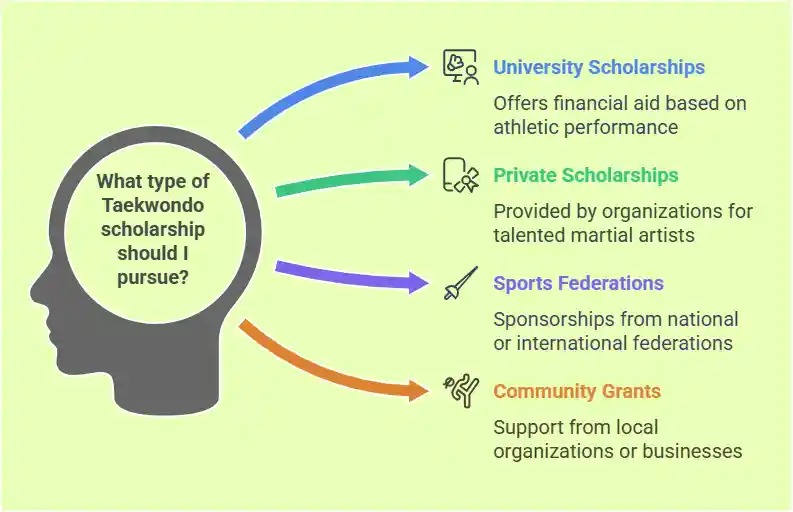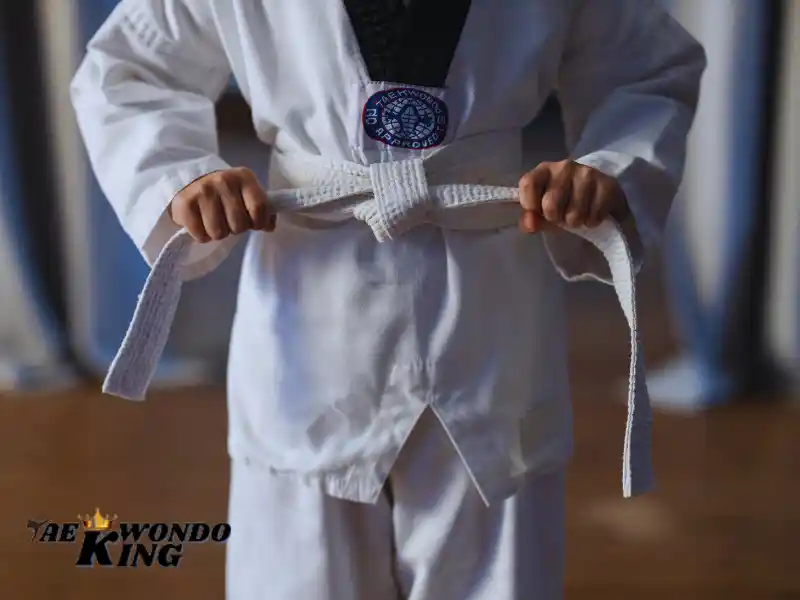
I still remember the day I first heard you could get a scholarship for Taekwondo, it felt like discovering a secret path no one talks about. For years, I poured my heart into every kick and form, not knowing it could open doors to college and beyond. As a national-level athlete and coach, I’ve helped students turn their passion for Taekwondo into real opportunities.
Get updates by joining Taekwondoking’s official WhatsApp channel.
In this guide, I’ll show you how to find, apply for, and win Taekwondo scholarships. Let’s turn your training into a future full of possibilities, stick with me!
Check out the latest prize in Taekwondo equipment on Amazon.

What is a Taekwondo Scholarship?
A Taekwondo scholarship provides financial support to athletes who excel in the sport of Taekwondo. Schools, universities, and sports organizations such as USA Taekwondo (USATKD), World Taekwondo (WT), and the International Taekwondo Federation (ITF) offer these scholarships to recognize talent and hard work.
To get a scholarship for Taekwondo, you need to demonstrate your achievements in tournaments, maintain strong academic performance, and show leadership qualities.
Taekwondo is more than a Korean martial art, it’s a discipline that teaches respect, perseverance, and athletic excellence. It also opens doors to educational opportunities, especially through athletic scholarships in the United States (NCAA schools), Europe, and Asia.
Types of Taekwondo Scholarships

I first started training in Taekwondo, and I never imagined it could lead to something as incredible as a scholarship. Over time, I learned that with dedication and the right mindset, opportunities like this are within reach.
Here are the main types of Taekwondo scholarships:
University Scholarships
Many colleges and universities (especially those under the NCAA – National Collegiate Athletic Association) offer athletic scholarships for Taekwondo players. Top-performing athletes often receive tuition support and financial aid.
Private Scholarships
Some foundations and nonprofit organizations provide private funding for talented martial artists. Examples include community-based sports endowments and martial arts associations.
Sports Federations
National and international federations like USA Taekwondo, World Taekwondo, and Olympic training programs may sponsor athletes for their dedication to the sport.
Community Grants
Local sports clubs, businesses, and community organizations often support athletes through scholarships or grants, especially for young practitioners who compete at regional or state-level tournaments.
Steps to Get a Scholarship for Taekwondo

Build a Strong Taekwondo Resume
Highlight:
- Tournament results (state, national, or international competitions like the World Taekwondo Championships or Pan American Games)
- Black belt certifications (Kukkiwon certification, Dan rank, or ITF equivalent)
- Leadership roles as a coach, referee, or team captain
Maintain Academic Performance
Strong academics improve your chances of securing a college scholarship. Universities value student-athletes who can balance training with education.
Research Scholarship Opportunities
- Visit university athletic departments
- Contact Taekwondo federations for available grants
- Apply to private martial arts scholarships and community sports programs
Prepare a Strong Application
Include:
- Personal statement showcasing passion for Taekwondo and academics
- Recommendation letters from coaches, teachers, or mentors
- Competition records and academic transcripts
Participate in Competitions
Competing at national championships, international tournaments, or Olympic qualifiers boosts your profile. Success in competitions demonstrates both skill and commitment.
Contact University Coaches
Reaching out to college Taekwondo coaches is key. Share your athletic resume, belt rank, competition results, and express interest in their scholar-athlete programs.
Check out the latest prize in Taekwondo equipment on Amazon.

Why Academic and Athletic Balance Matters
Scholarships reward students who balance sports performance with academic excellence. Colleges and federations value athletes who are:
- Demonstrating discipline, perseverance, and sportsmanship through Taekwondo
- Well-rounded students
- Achieving high GPA scores.
Top Tips to Get a Scholarship for Taekwondo

Focus on academics: Many programs require maintaining minimum GPA standards.
Start early: Begin applications in high school.
Train consistently: Work with qualified Taekwondo instructors.
Build relationships: Network with Taekwondo coaches, referees, and mentors.
Highlight leadership: Roles as a coach, referee, or team leader add value.
Attend Taekwondo camps: Exposure to Olympic training centers and international camps improves skills.
Scholarship Availability Matrix
In 2026, securing a scholarship for Taekwondo is a highly competitive but rewarding path for elite martial artists. Unlike traditional team sports, Taekwondo scholarships often come from a mix of collegiate athletic departments, private foundations, and international governing bodies.
To succeed, an athlete must demonstrate not only technical mastery on the mats but also academic excellence and a documented history of competitive success. This guide breaks down the strategic “hacks” to position yourself as a top-tier candidate for financial aid through your martial arts talent.
| Scholarship Type | Provider | Key Requirement | Value Range |
| Collegiate Athletic | University Teams | National/International Ranking | Partial to Full Tuition |
| Foundation-Based | Organizations like USA Taekwondo | Demonstrated Need + Potential | $1,000 – $5,000 |
| International | Kukkiwon / Global Federations | Tournament Gold Medals | Full Training Costs |
| Academic-Athletic | Private Colleges | High GPA + Black Belt Status | Variable |
The “Elite Athlete” Verdict
The real “hack” in 2026 is Visibility. It is no longer enough to be the best in your local dojo; you must have a presence in the National Collegiate Taekwondo Association (NCTA) circuit. If your goal is a full ride, focus on balancing your “Indomitable Spirit” with a high SAT/ACT score, as academic-athletic crossovers are the most common scholarship types available today.
Scholarship Resources for Taekwondo Athletes
Here are some resources to help you get a scholarship for Taekwondo:
- USA Taekwondo (USATKD) – Official governing body in the U.S., affiliated with World Taekwondo
- NCAA Scholarships – Universities offering student-athlete support
- Private Grants & Foundations – Martial arts-specific scholarships
- Local Sports Clubs & Community Programs – Regional sponsorships for youth athletes
Utilizing these resources will make your journey to get a scholarship for Taekwondo easier.
Check out the latest prize in Taekwondo equipment on Amazon.

Benefits of Taekwondo Scholarships
Earning a scholarship has many advantages:
- Financial support for tuition and training
- Access to elite training facilities and Olympic coaches
- Recognition for martial arts excellence
- Opportunities to study at top universities
- Pathways to represent your country in international competitions.
When you get a scholarship for Taekwondo. It opens doors for personal and professional growth.
Conclusion
To get a Taekwondo scholarship, you need dedication, preparation, and consistency. Build a strong resume with competition results, academic performance, and leadership experience.
Start early, apply widely, and connect with coaches, federations, and organizations. With perseverance, you can achieve your dream of being both a scholar and an athlete in the world of Taekwondo.
Check out the latest prize in Taekwondo equipment on Amazon.
FAQs
The best college sport depends on your goals, but football and basketball often offer the most exposure, scholarships, and career opportunities. Learn more about picking your path.
STEM majors like engineering, computer science, and biology typically get the most scholarship support due to high demand. Learn more about top-funded majors.
Track and field, swimming, and soccer are great for college admission thanks to broad recruiting. Smaller teams often need more athletes. Learn more about recruitment trends.
Football and men’s basketball bring in the most money for colleges through ticket sales, TV deals, and sponsorships. Learn more about sports revenue in college.
Football offers the most scholarships due to large rosters and NCAA funding. It’s followed by basketball and track. Learn more about scholarship numbers by sport.
Wrestling, gymnastics, and tennis are highly competitive with fewer scholarships. Talent must be elite. Learn more about tough scholarship sports.
Lacrosse, rowing, and track offer better chances due to less competition and more open slots. Learn more about easy scholarship opportunities in high school.


Founder, Owner, and CEO of TaekwondoKing.
He is one of the top 100 martial artists in the World and among the top 20 referees in Bangladesh.
Ehatasamul Alom is an esteemed Kukkiwon Certified Taekwondo 3rd Dan Black Belt with over 15 years of experience in this dynamic martial art. Born in Rajshahi, Bangladesh, Ehatasamul’s journey with Taekwondo began at the tender age of seven. His passion led him to compete at national and international levels, where he has bagged numerous awards and honors. He is also a member of the Taekwondo National Referee Panel.
With a Bachelor’s degree in Sports Science from the prestigious Rajshahi University, Ehatasamul has a deep understanding of the technical and scientific aspects of martial arts and some other martial arts.
In 2022, Ehatasamul created the “TaekwondoKing.com” to share his knowledge, Free Resources, Values, and Real experiences. His articles focus on Taekwondo training techniques, competition strategies, Sport Products Reviews, and the art’s rich history and philosophy. He also writes about the importance of mental fortitude and discipline, key aspects of his teaching philosophy. He has already launched many sports, Taekwondo, and health-related Free online tools. His goal is to inspire both beginners and seasoned practitioners worldwide through insightful and engaging content.
If you need any help, contact Ehatasamul Alom at any time.




